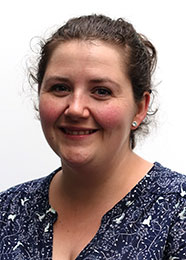
Contact Details
- Phone
- +64 3 364 0557
- elisabeth.phillips@otago.ac.nz
University Links
- Position
- Research Fellow
- Department
- Department of Pathology and Biomedical Science (Christchurch)
- Qualifications
- BSc(Hons)(Sheffield), PhD(Birmingham)
- Research summary
- Breast Cancer
Research
Dr Elisabeth Phillips is an emerging cancer researcher who has research interests in cancer, particularly the tumour microenvironment and therapy resistance.
Cancer does not develop in isolation. A milieu of other cells, extracellular matrix component and physical stressors surround cancers as they develop and grow, creating a permissive environment for the initiation, growth and metastasis of cancer. Adipose tissue is present within the tumour microenvironment of several invasive cancers. Adipocytes have the ability to secrete a plethora of chemical signals and can form physical interactions with surrounding cells. This ‘cross-talk’ between cancer and adipocytes enables change of phenotype of both the cancer and the adipocytes, which is thought to be exacerbated under obesogenic conditions. The adipocytes within the tumour microenvironment that display this activated phenotype are named Cancer Associated Adipocytes (CAA).
Our research has used cutting-edge molecular techniques to probe this dynamic cellular interaction in vitro and in clinical samples, with the aim of finding underlying mechanisms that have the potential to be exploited for targeted therapy.
We have used in vitro models with primary human breast adipocytes cultured together with cancer cells and used a combination of OMICs technologies to investigate changes within the breast cancer cells. We have also used mass-spectrometry based proteomics to profile the changes that occur in the secreted factors released by the adipocytes after. Using this data, we are working to identify how to exploit CAAs to target tumours more effectively through studying the pathways that are fundamental to their pro-tumour functions in vitro and in people with cancer through clinical samples.
In addition, we, in collaboration with Dr Khoon Lim (Christchurch REgenerative and Tissue Engineering group), are further developing an in vitro, 3-dimensional model that we will use to investigate the CAA: Cancer interaction using a combination of cell and molecular biology approaches.